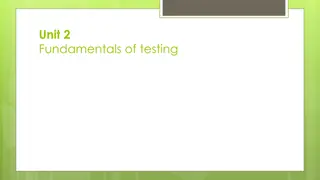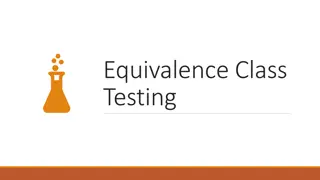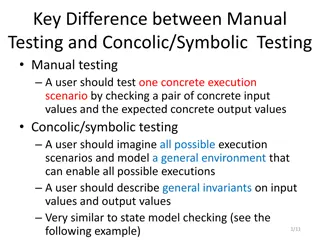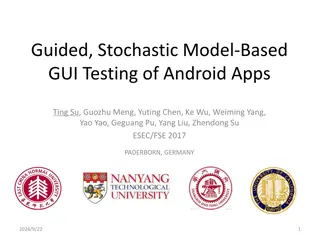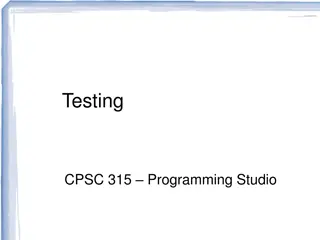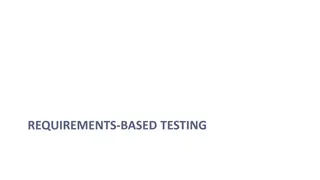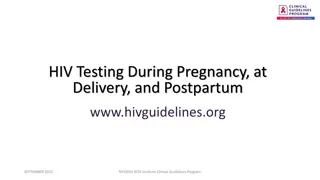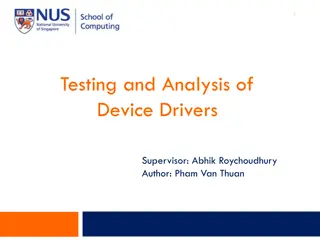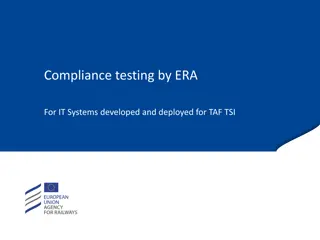Difference Between Manual Testing and Model Checking
Manual testing focuses on testing specific scenarios with concrete inputs and outputs, while model checking involves imagining all possible scenarios to create a general environment for testing. In manual testing, users test specific execution scenarios, whereas in model checking, users envision and test all possible executions. Manual testing involves checking concrete values, while model checking involves describing general invariants on input and output values.
Download Presentation

Please find below an Image/Link to download the presentation.
The content on the website is provided AS IS for your information and personal use only. It may not be sold, licensed, or shared on other websites without obtaining consent from the author.If you encounter any issues during the download, it is possible that the publisher has removed the file from their server.
You are allowed to download the files provided on this website for personal or commercial use, subject to the condition that they are used lawfully. All files are the property of their respective owners.
The content on the website is provided AS IS for your information and personal use only. It may not be sold, licensed, or shared on other websites without obtaining consent from the author.
E N D
Presentation Transcript
Key Difference between Manual Testing and Model Checking Manual testing (unit testing) A user should test one concrete execution scenario by checking a pair of concrete input values and the expected concrete output values Model checking (concolic testing) A user should imagine all possible execution scenarios and model a general environment that can enable all possible executions A user should describe general invariants on input values and output values 1/11
Ex1. Circular Queue of Positive Integers #include<stdio.h> #define SIZE 12 #define EMPTY 0 Step 1) 0 1 2 3 4 5 6 7 8 9 10 11 0 0 0 0 0 0 15 6 9 8 4 0 // We assume that q[] is // empty if head==tail unsigned int q[SIZE],head,tail; head=6 tail=11 Step 2) 3 5 0 0 0 0 15 6 9 8 4 17 void enqueue(unsigned int x) { q[tail]=x; tail=(++tail)%SIZE; } head=6 tail=2 Step 3) 3 5 0 0 0 0 0 6 9 8 4 17 unsigned int dequeue() { unsigned int ret; ret = q[head]; q[head]=0; head= (++head)%SIZE; return ret;} head=7 tail=2 2/11
void dequeue_verify() { unsigned int ret, old_head, old_tail; unsigned int old_q[SIZE], i; void enqueue_verify() { unsigned int x, old_head, old_tail; unsigned int old_q[SIZE], i; __CPROVER_assume(x>0); for(i=0; i < SIZE; i++) old_q[i]=q[i]; old_head=head; old_tail=tail; __CPROVER_assume(head!=tail); for(i=0; i < SIZE; i++) old_q[i]=q[i]; old_head=head; old_tail=tail; ret= ret=dequeue dequeue(); (); enqueue enqueue(x); (x); assert(ret==old_q[old_head]); assert(q[old_head]== EMPTY); assert(head==(old_head+1)%SIZE); assert(tail==old_tail); for(i=0; i < old_head; i++) assert(old_q[i]==q[i]); for(i=old_head+1; i < SIZE; i++) assert(old_q[i]==q[i]);} assert(q[old_tail]==x); assert(tail== ((old_tail +1) % SIZE)); assert(head==old_head); for(i=0; i < old_tail; i++) assert(old_q[i]==q[i]); for(i=old_tail+1; i < SIZE; i++) assert(old_q[i]==q[i]); } int main() {// cbmc q.c unwind SIZE+2 environment_setup(); dequeue_verify();} int main() {// cbmc q.c unwind SIZE+2 environment_setup(); enqueue_verify();}
// Initial random queue setting following the script void environment_setup() { int i; for(i=0;i<SIZE;i++) { q[i]=EMPTY;} #include<stdio.h> #define SIZE 12 #define EMPTY 0 head=non_det(); __CPROVER_assume(0<= head && head < SIZE); unsigned int q[SIZE],head,tail; tail=non_det(); __CPROVER_assume(0<= tail && tail < SIZE); void enqueue(unsigned int x) { q[tail]=x; tail=(++tail)%SIZE; } if( head < tail) for(i=head; i < tail; i++) { q[i]=non_det(); __CPROVER_assume(0< q[i]); } else if(head > tail) { for(i=0; i < tail; i++) { q[i]=non_det(); __CPROVER_assume(0< q[i]); } for(i=head; i < SIZE; i++) { q[i]=non_det(); __CPROVER_assume(0< q[i]); } } // We assume that q[] is empty if head==tail unsigned int dequeue() { unsigned int ret; ret = q[head]; q[head]=0; head= (++head)%SIZE; return ret; } }





